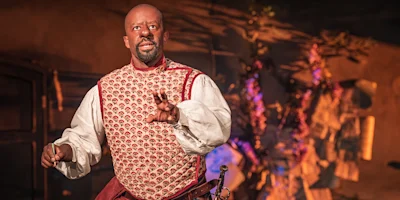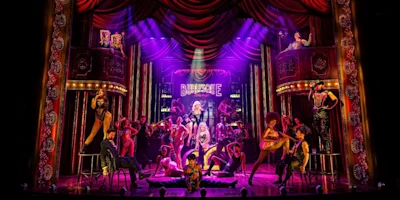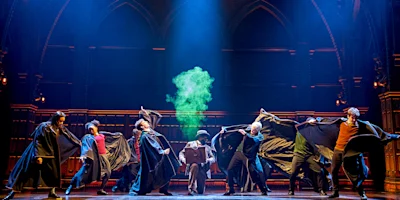
A complete guide to 'Good' starring David Tennant in the West End
One of the most eye-catching West End openings this winter is the much-anticipated revival of CP Taylor’s play Good, starring David Tennant. Running at London’s Harold Pinter Theatre, the show asks what makes a “good” man, and how that might change in the face of survival – or temptation. Set in 1930s Germany, it’s a highly charged political piece that should land with renewed force today.
Here’s our guide to what makes this such an impactful play, its history, and what we can expect from this run of Good with David Tennant.

The origins of Good
The play Good, by Cecil Philip Taylor (known as CP Taylor), was commissioned by the Royal Shakespeare Company in 1981 and made its premiere that September at the Donmar Warehouse in London. Directed by Howard Davies, it starred two renowned actors: Alan Howard and Timothy Walker. Good has since been lauded worldwide, with fellow playwright Alan Peter calling it “arguably the definitive piece written about the Holocaust in the English-speaking theatre.”
The drama centres on an urbane literature professor John Halder, based in Frankfurt, who is “good” in every obvious way: a respected academic and a kind family man, who cares for his aged mother, who has dementia, as well as his wife and children. When the National Socialists start spouting anti-Semitic hate, he reassures his best friend, Jewish psychiatrist Maurice, that it’s just a way to distract the public — nothing to worry about.
However, over the next eight years, we see all of those “good” qualities disintegrate (plot spoilers follow in this paragraph!). Halder leaves his wife for a student and joins the SS, after Hitler showed interest in his novel about euthanasia. Halder might have spoken about wanting to guide the Nazis towards humanity, but instead the Nazi Party bring out his latent qualities: an icy moral detachment, a career ambition that overrides all empathy.
Halder’s detachment from reality is represented by a musical score that he hears in his head, drowning out whatever he doesn’t want to deal with — and which eventually becomes an actual band of inmates at Auschwitz. It is, crucially, a play that uses music throughout, both as a way of interrogating the psyche of its central character and as a dramatic device. Sometimes the tragedy is expressed as musical comedy; sometimes the music underscores the horror.

Why Good has such power
The masterstroke of Taylor’s play is that instead of separating people into good and bad, heroes and villains, he shows the potential in a seemingly decent man for corruption. The Nazi Party spies the moral flaws, like vanity and detachment, in Halder, and they exploit those qualities, until Halder is at a point where he is committing atrocities but intellectually rationalising them. Yet he doesn’t seem like a monster when we meet him.
It’s a warning from history of this slippery slope – how easy it is to be seduced by flattering ideology, at the dire expense of others, and how seemingly good people can be susceptible. We live in a time of extremism once again, with far-right regimes, politicians using populism to their own ends, or dictators conjuring phantom enemies in order to keep a grip on power.
Taylor’s play demonstrates that we might not start out at that crisis point: it’s when our “normal” starts to be eroded that we should worry – like our democratic norms being chipped away by extreme factions like Brexiteers in the UK or by President Trump in America. We can never take civil liberties for granted, and Good challenges us at every step to ask what we would do in that situation.
The premiere production had a huge impact, and went on to play at the RSC’s home in Stratford and then on tour, plus it transferred to the Aldwych Theatre in the West End. It then became a celebrated play internationally, including a hit run on Broadway. Good has continued to be staged over the years, and was also adapted into a movie in 2008 starring Viggo Mortensen, Jason Isaacs and Jodie Whittaker.

The 2022 revival of Good
Now, we have a major West End revival of Good – and it will likely feel very topical given the recent attacks on our democracy and liberty, such as the storming of the US Capitol or Russia’s invasion of Ukraine. Sometimes it takes a lesson from history to really help us understand the present, and this revival could have a major impact.
The new production at the Harold Pinter Theatre stars David Tennant. The Scottish star is of course known for screen work like Doctor Who, Broadchurch, There She Goes, Staged, Good Omens and Inside Man, but is also an accomplished stage actor. His past theatre work includes The Pillowman at the National Theatre, Hamlet and Richard II for the RSC, and Much Ado About Nothing and Don Juan in Soho in the West End.
Tennant is joined in the Good cast by Elliot Levey, who recently won an Olivier Award for playing Herr Shultz in Cabaret at the Playhouse Theatre. His other work includes Mary Stuart and Much Ado About Nothing (with David Tennant) in the West End, Quiz and Peaky Blinders on TV, and films such as Florence Foster Jenkins, The Queen, and The Lady in the Van.
Also starring is Sharon Small, whose theatre work includes The Threepenny Opera at the National Theatre, The Trials at Donmar Warehouse, and The Arden of Faversham for the RSC. Among her numerous screen credits are shows like Downton Abbey, Call the Midwife, Mistresses, and The Inspector Lynley Mysteries.
The production is being directed by Dominic Cooke, who won an Olivier Award for The Crucible, and helmed National Theatre productions like the lauded revivals of Sondheim’s Follies and August Wilson’s Ma Rainey’s Black Bottom. He also directed The Hollow Crown: The Wars of the Roses on TV.
That combination of a crack creative team and a powerful play for our times should make for an extraordinary combination: theatre at its most thought-provoking and explosive.
Photo credit: Good (Photos courtesy of production)
Originally published on









